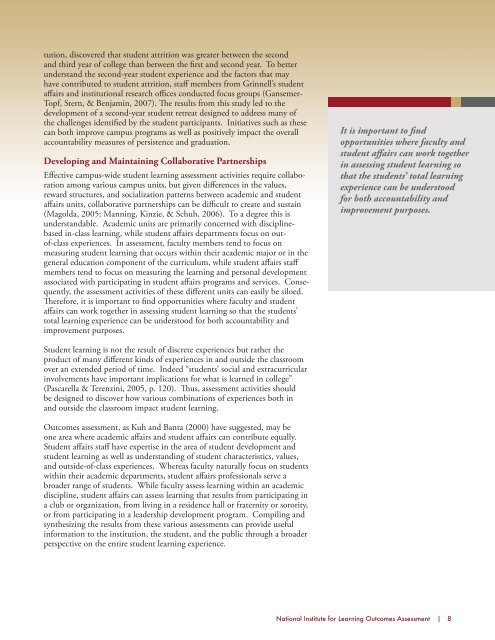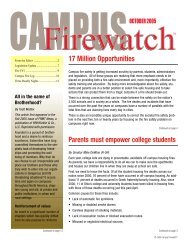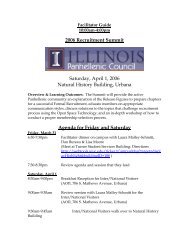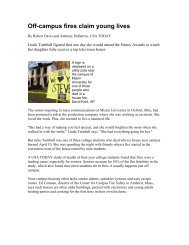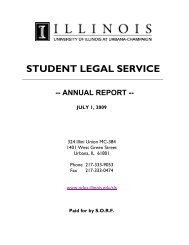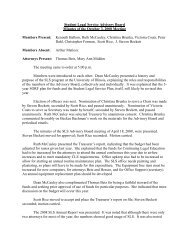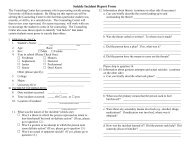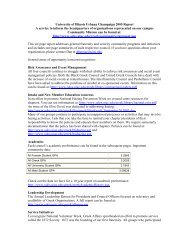StudentAffairsRole in Assessment - Office of the Dean of Students ...
StudentAffairsRole in Assessment - Office of the Dean of Students ...
StudentAffairsRole in Assessment - Office of the Dean of Students ...
You also want an ePaper? Increase the reach of your titles
YUMPU automatically turns print PDFs into web optimized ePapers that Google loves.
tution, discovered that student attrition was greater between <strong>the</strong> second<br />
and third year <strong>of</strong> college than between <strong>the</strong> first and second year. To better<br />
understand <strong>the</strong> second-year student experience and <strong>the</strong> factors that may<br />
have contributed to student attrition, staff members from Gr<strong>in</strong>nell’s student<br />
affairs and <strong>in</strong>stitutional research <strong>of</strong>fices conducted focus groups (Gansemer-<br />
Topf, Stern, & Benjam<strong>in</strong>, 2007). The results from this study led to <strong>the</strong><br />
development <strong>of</strong> a second-year student retreat designed to address many <strong>of</strong><br />
<strong>the</strong> challenges identified by <strong>the</strong> student participants. Initiatives such as <strong>the</strong>se<br />
can both improve campus programs as well as positively impact <strong>the</strong> overall<br />
accountability measures <strong>of</strong> persistence and graduation.<br />
Develop<strong>in</strong>g and Ma<strong>in</strong>ta<strong>in</strong><strong>in</strong>g Collaborative Partnerships<br />
Effective campus-wide student learn<strong>in</strong>g assessment activities require collaboration<br />
among various campus units, but given differences <strong>in</strong> <strong>the</strong> values,<br />
reward structures, and socialization patterns between academic and student<br />
affairs units, collaborative partnerships can be difficult to create and susta<strong>in</strong><br />
(Magolda, 2005; Mann<strong>in</strong>g, K<strong>in</strong>zie, & Schuh, 2006). To a degree this is<br />
understandable. Academic units are primarily concerned with discipl<strong>in</strong>ebased<br />
<strong>in</strong>-class learn<strong>in</strong>g, while student affairs departments focus on out<strong>of</strong>-class<br />
experiences. In assessment, faculty members tend to focus on<br />
measur<strong>in</strong>g student learn<strong>in</strong>g that occurs with<strong>in</strong> <strong>the</strong>ir academic major or <strong>in</strong> <strong>the</strong><br />
general education component <strong>of</strong> <strong>the</strong> curriculum, while student affairs staff<br />
members tend to focus on measur<strong>in</strong>g <strong>the</strong> learn<strong>in</strong>g and personal development<br />
associated with participat<strong>in</strong>g <strong>in</strong> student affairs programs and services. Consequently,<br />
<strong>the</strong> assessment activities <strong>of</strong> <strong>the</strong>se different units can easily be siloed.<br />
Therefore, it is important to f<strong>in</strong>d opportunities where faculty and student<br />
affairs can work toge<strong>the</strong>r <strong>in</strong> assess<strong>in</strong>g student learn<strong>in</strong>g so that <strong>the</strong> students’<br />
total learn<strong>in</strong>g experience can be understood for both accountability and<br />
improvement purposes.<br />
It is important to f<strong>in</strong>d<br />
opportunities where faculty and<br />
student affairs can work toge<strong>the</strong>r<br />
<strong>in</strong> assess<strong>in</strong>g student learn<strong>in</strong>g so<br />
that <strong>the</strong> students’ total learn<strong>in</strong>g<br />
experience can be understood<br />
for both accountability and<br />
improvement purposes.<br />
Student learn<strong>in</strong>g is not <strong>the</strong> result <strong>of</strong> discrete experiences but ra<strong>the</strong>r <strong>the</strong><br />
product <strong>of</strong> many different k<strong>in</strong>ds <strong>of</strong> experiences <strong>in</strong> and outside <strong>the</strong> classroom<br />
over an extended period <strong>of</strong> time. Indeed “students’ social and extracurricular<br />
<strong>in</strong>volvements have important implications for what is learned <strong>in</strong> college”<br />
(Pascarella & Terenz<strong>in</strong>i, 2005, p. 120). Thus, assessment activities should<br />
be designed to discover how various comb<strong>in</strong>ations <strong>of</strong> experiences both <strong>in</strong><br />
and outside <strong>the</strong> classroom impact student learn<strong>in</strong>g.<br />
Outcomes assessment, as Kuh and Banta (2000) have suggested, may be<br />
one area where academic affairs and student affairs can contribute equally.<br />
Student affairs staff have expertise <strong>in</strong> <strong>the</strong> area <strong>of</strong> student development and<br />
student learn<strong>in</strong>g as well as understand<strong>in</strong>g <strong>of</strong> student characteristics, values,<br />
and outside-<strong>of</strong>-class experiences. Whereas faculty naturally focus on students<br />
with<strong>in</strong> <strong>the</strong>ir academic departments, student affairs pr<strong>of</strong>essionals serve a<br />
broader range <strong>of</strong> students. While faculty assess learn<strong>in</strong>g with<strong>in</strong> an academic<br />
discipl<strong>in</strong>e, student affairs can assess learn<strong>in</strong>g that results from participat<strong>in</strong>g <strong>in</strong><br />
a club or organization, from liv<strong>in</strong>g <strong>in</strong> a residence hall or fraternity or sorority,<br />
or from participat<strong>in</strong>g <strong>in</strong> a leadership development program. Compil<strong>in</strong>g and<br />
syn<strong>the</strong>siz<strong>in</strong>g <strong>the</strong> results from <strong>the</strong>se various assessments can provide useful<br />
<strong>in</strong>formation to <strong>the</strong> <strong>in</strong>stitution, <strong>the</strong> student, and <strong>the</strong> public through a broader<br />
perspective on <strong>the</strong> entire student learn<strong>in</strong>g experience.<br />
National Institute for Learn<strong>in</strong>g Outcomes <strong>Assessment</strong> | 8


